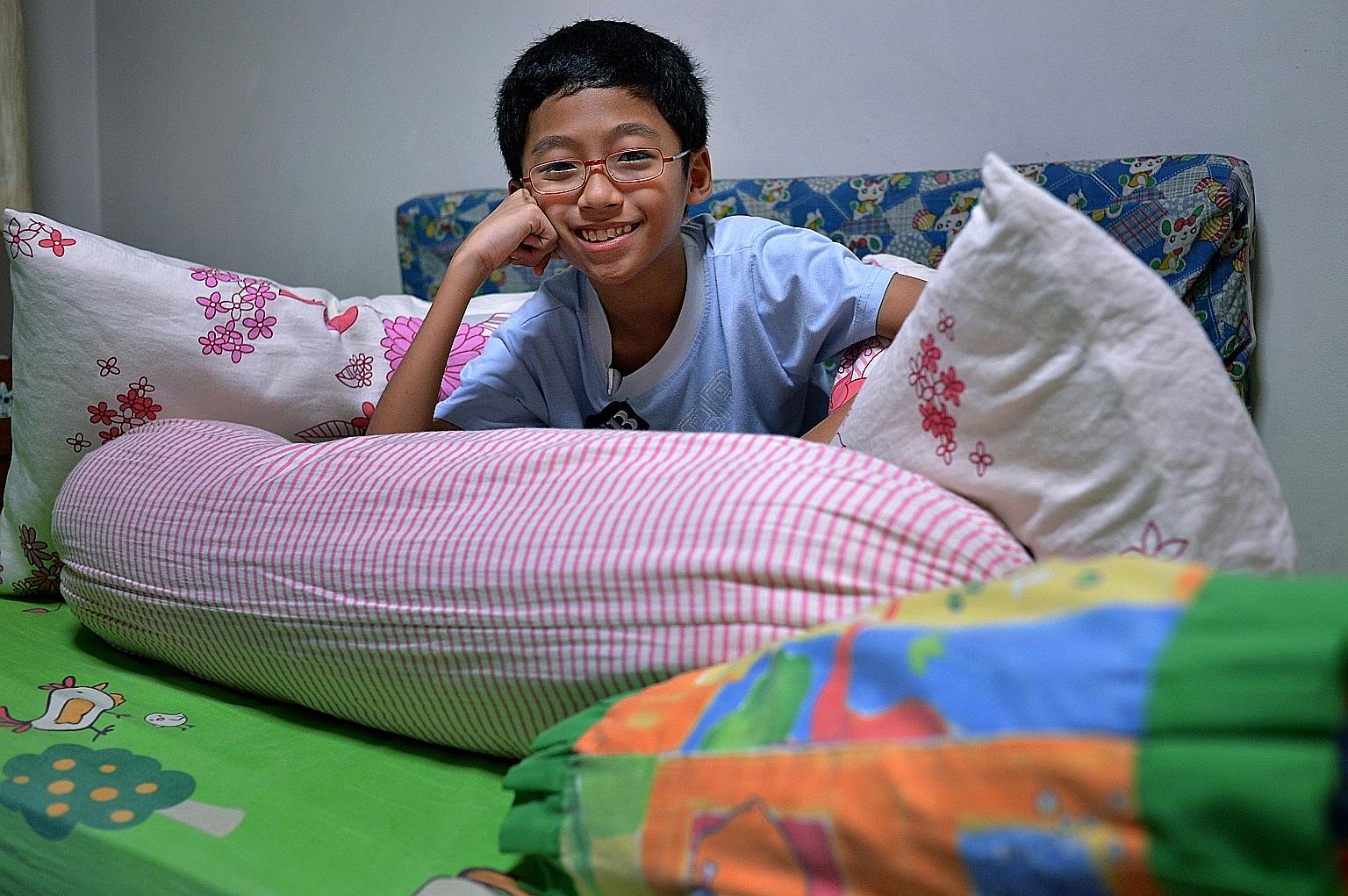LIVING WITH INVISIBLE DISABILITIES
Class pranksters forgot he could bleed to death
Sign up now: Get ST's newsletters delivered to your inbox

Kai Jun, 12, suffers from severe haemophilia, and his parents pad his room with extra mattresses and pillows to cushion him from any falls or bumps that could cause him to bleed.
ST PHOTO: KUA CHEE SIONG
His classmates knew he could bleed to death if he was injured, but that did not stop some of them from tripping him up during lesson breaks, or pulling away a chair when he tried to sit down.
For four years in primary school, Ang Kai Jun, now 12 and in secondary school, endured the antics of fellow pupils who failed to comprehend the severity of his illness.
Kai Jun has severe haemophilia, a rare genetic condition in which the blood does not clot properly. There is no cure. Victims bruise easily when they fall, and suffer bleeding into their muscles and joints.
His prankster pals were not being nasty; they sometimes simply forgot he had a disorder.
Kai Jun, who learnt to be more alert to protect himself, says: "It is good that this illness is not visible because I feel like a normal person, but it is also bad because when people can't see it, they forget I have it."
Haemophilia
NUMBER AFFECTED
About one in 10,000 people is born with it so there are about 500 haemophiliacs here; 250 are members of the Haemophilia Society of Singapore (HSS).
NATURE OF DISABILITY
A rare inherited blood disorder in which blood does not clot properly. Signs include large bruises, bleeding into muscles and joints, sudden or prolonged bleeding. Generally affects males. Sufferers should avoid physically demanding activities; strenuous sex may trigger bleeding.
TREATMENT/SUPPORT
Treatment involving regular injections of clotting agents to prevent spontaneous bleeding costs $3,000 to $4,000 a month, before subsidies. But with subsidies from the Government and HSS, the treatment costs under a quarter of the original price. HSS also organises educational talks and fundraising events.
RESOURCES
e-mail: haemophilia.sg@gmail.com
Though he has severe haemophilia, which means he does not have any blood-clotting factors and requires regular injections of clotting agents, he is fortunate to be able to benefit from medical advances.
More patients can now go for preventive treatment like injections that make a difference to joints. Joint damage is a common problem, caused by uncontrolled internal bleeding. It can lead to crippling joint disease. In the past, treatment was given only when the patient noticed he was suffering a bleed.
The last time Kai Jun had a bleed was two years ago, and with his condition under control, his parents think he will be better able to assimilate into society when he grows up.
For older haemophiliac Y.S. Sum, 55, who walks with a limp due to joint damage, life is not so rosy. He was sacked from his last job -working in a warehouse - in 2012 for taking medical leave two to three days a week to manage his illness. He is still jobless. He says: "I don't blame people who are unkind to me, because many Singaporeans don't know about the illness."
Haemophiliacs overseas also face discrimination. Last year, a student in Beijing sued his university after he was allegedly expelled for having haemophilia, although the disease is not contagious. Under an Education Ministry rule in China, universities can refuse to admit students with serious blood diseases.
Kai Jun's mother, Madam Khim Chua, 37, says it is not practical for her only child to go around telling strangers he has a disability. "When he takes the bus home, I just remind him to find a seat quickly - but if he can't, to grab the handlebars in case the bus jerks," says Madam Chua.
But she makes it a point to educate people in frequent contact with him. Every year, she gives out guides on the condition to his teachers. During home economics lessons, knives are kept away from him to prevent him from being cut.
"As I grow older, my friends understand and are supportive," says Kai Jun. "Still, not many people are aware of what it is, and they often give me the 'blur' look."
Janice Tai


